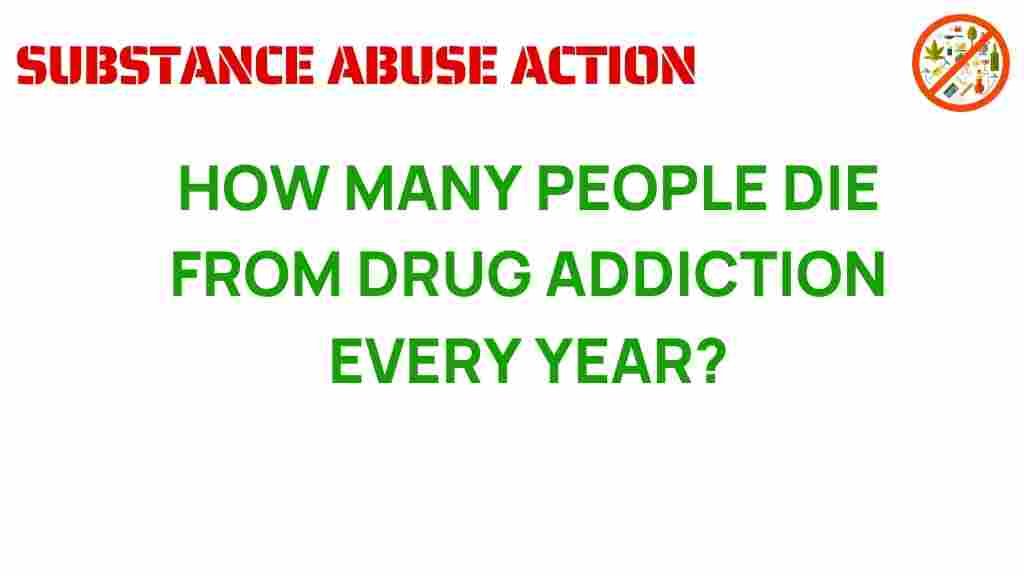The Harrowing Truth: Annual Drug Addiction Death Toll Revealed
Drug addiction is a pervasive health crisis affecting millions of individuals and families worldwide. The statistics regarding the death toll associated with substance abuse paint a grim picture of an epidemic that continues to escalate. Understanding the magnitude of this issue is crucial for awareness, prevention, recovery, and treatment. In this article, we will explore the alarming statistics surrounding drug addiction, the impact of substance abuse, and how we can combat this crisis through effective strategies.
The Current State of Drug Addiction and Death Toll Statistics
According to the latest statistics, drug addiction has reached unprecedented levels. The Centers for Disease Control and Prevention (CDC) reports that over 100,000 people died from drug overdoses in the United States alone in the past year. This figure represents a staggering increase compared to previous years, highlighting the urgent need for intervention.
- Opioids: The primary driver of the epidemic, with synthetic opioids like fentanyl contributing to the majority of overdose deaths.
- Stimulants: The rise in methamphetamine and cocaine use also plays a significant role in the increasing death toll.
- Polysubstance Use: Many individuals are using multiple substances, which increases the risk of overdose.
The Impact of Substance Abuse on Society
The consequences of drug addiction extend beyond individual health, affecting families, communities, and the healthcare system. The societal impact includes:
- Increased Healthcare Costs: Substance abuse leads to higher medical expenses and demands on healthcare resources.
- Crime Rates: Drug-related crimes contribute to increased law enforcement and judicial costs.
- Lost Productivity: Addiction can lead to job loss and decreased workforce participation.
Understanding the Epidemic
The drug addiction epidemic is fueled by various factors, including:
- Accessibility: The availability of drugs, both legal and illegal, has increased dramatically.
- Socioeconomic Factors: Poverty, lack of education, and unemployment can contribute to substance abuse.
- Mental Health Disorders: Many individuals struggling with addiction also face mental health challenges, creating a complex cycle.
Prevention Strategies
Preventing drug addiction and reducing the death toll requires comprehensive strategies. Here are some effective prevention methods:
- Education and Awareness: Raising awareness about the risks of substance abuse can help deter individuals from using drugs.
- Community Programs: Engaging communities in prevention efforts can lead to a more supportive environment.
- School-Based Initiatives: Implementing educational programs in schools can educate young people about the dangers of drugs.
Recovery and Treatment Options
For those affected by drug addiction, recovery is possible. Various treatment options are available to support individuals on their journey to sobriety:
- Detoxification: The first step in recovery often involves detox to manage withdrawal symptoms safely.
- Rehabilitation Programs: Inpatient and outpatient programs provide comprehensive support and therapy.
- Support Groups: Programs like Alcoholics Anonymous (AA) and Narcotics Anonymous (NA) offer peer support.
Step-by-Step Process for Seeking Help
If you or someone you know is struggling with drug addiction, taking the first step toward recovery can be challenging. Here’s a step-by-step guide:
- Acknowledge the Problem: Recognizing and admitting that there is an addiction is crucial.
- Research Treatment Options: Look for local treatment centers, support groups, and resources.
- Seek Professional Help: Consult with healthcare professionals who specialize in addiction treatment.
- Develop a Support Network: Engage family and friends in the recovery process for encouragement.
- Commit to the Recovery Journey: Recovery is a long-term commitment; stay focused and motivated.
Troubleshooting Common Challenges in Recovery
Recovery from drug addiction can present various challenges. Here are some common issues and how to address them:
- Triggers: Identify and avoid situations or people that may trigger drug cravings.
- Relapse: Understand that relapse can be part of the recovery process; learning from it is essential.
- Isolation: Stay connected with support groups and loved ones to avoid feelings of loneliness.
Raising Awareness: The Key to Combating the Crisis
Awareness is a powerful tool in fighting the drug addiction epidemic. By educating ourselves and others about the realities of substance abuse, we can foster an environment that supports recovery and prevention. Here are some ways to raise awareness:
- Host Community Events: Organize events that focus on education and prevention.
- Use Social Media: Share informative articles and personal stories to highlight the impact of addiction.
- Collaborate with Local Organizations: Partner with local health organizations to spread awareness.
For more information on drug addiction and its effects, you can visit the Substance Abuse and Mental Health Services Administration.
Conclusion
The death toll from drug addiction is a stark reminder of the ongoing health crisis we face today. By understanding the statistics surrounding substance abuse, recognizing the factors contributing to the epidemic, and implementing effective prevention and treatment strategies, we can make significant strides in combating this issue. Recovery is possible, and with increased awareness and support, we can help individuals reclaim their lives from the grips of addiction.
Let us continue to raise awareness, support those in recovery, and work towards a future where the devastating impact of drug addiction is minimized. Together, we can turn the tide against this epidemic.
This article is in the category Health and created by SubstanceAbuseAction Team
